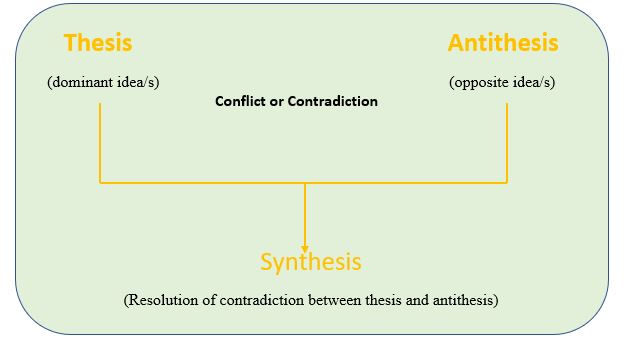Introduction
In philosophy the ‘dialectic’ was initially used by Socrates (470-390 BC), Plato (427-397 BC), and Aristotle (384-322 BC) as one of the main tool or method to know & understand the reality. In Plato’s dialogues one can observe that to understand any concept or idea, there is always a rigorous debate or contradictions between different characters. After its earlier use by these great philosophers, it was Immanuel Kant (1724-1804), G.W.F. Hegel (1770-1831), and Karl Marx (1818-1883) who reintroduced ‘dialectic method’ in modern times and further developed it.
Marx’s thought was greatly shaped by the influence of Hegel as he was trained in the Hegelian tradition during his university years. Among many other ideas, Marx also adopted and reshaped the method of dialectic from Hegel’s writings. However, he was critical of the way Hegel used it. For example, Hegel applied the dialectic only to ideas, whereas Marx applied it to more material aspects of life, like economy. Another German Philosopher Feuerbach who critiqued the idealist position of Hegel and focused on materialism has also influenced Marx. Thus, combining the Hegel’s dialectic and Feuerbach’s materialism, Marx introduced “Dialectic Materialism” which focuses on dialectical relationships within the material world. Here we will discuss about the dialectical materialism as used by Marx.
Meaning
The basic idea of dialectics is the centrality of contradiction. Dialectical philosophy believes that contradictions exist in reality and that the most appropriate way to understand reality is to study the development of those contradictions. Generally, dialectics tries to highlight the contradiction (oppositions) within the unity of any ideas, process, or material reality.
The dialectic is both a way of thinking and an image of the world. On the one hand, it is a way of thinking (reason/logic) that stresses the importance of processes, relations, dynamics, conflicts, and contradictions – a dynamic rather than a static way of thinking about the world. On the other hand, it is a view that the world is made up not of static structures but of processes, relationships, dynamics, conflicts, and contradictions.
As Marx Dialects is based on Hegel’s, so firstly we will understand Hegel’s dialectical method. Hegel saw dialects as a process which brings out the implicit or hidden tension (contradictions) inherent in almost all aspects of social life. Hegel argued that all the change in history is because of dialects between the opposing idea or tendencies through following process:
- Thesis (the dominant ideas of an epoch)
- Antithesis (opposing ideas)
- Synthesis (elements of both, Resolution of conflict between thesis and antithesis)

According to Hegel, historical change has been driven by the contradictory understandings that are the essence of reality, by our attempts to resolve the contradictions, and by the new contradictions that develop.
Marx adopted the scheme of dialects of Hegel and “turned down on its head”. Whereas Hegel preferred the dialects of ideas and consciousness, Marx has focused on dialects of material conditions. Unlike Hegel, Marx did not believe that these contradictions could be worked out in our understanding, that is, in our minds. Instead, for Marx these are real, existing contradictions. For Marx, such contradictions are resolved not by the philosopher sitting in an armchair but by a life-and-death struggle that changes the social world. This was a crucial transformation because it allowed Marx to move the dialectic out of the realm of philosophy and into the realm of a study of social relations grounded in the material world. It is this focus that makes Marx’s work so relevant to sociology, even though the dialectical approach is very different from the mode of thinking used by most sociologists. The dialectic leads to an interest in the conflicts and contradictions among various levels of social reality, rather than to the more traditional sociological interest in the ways these various levels mesh neatly into a cohesive whole.
To Marx material condition are more important than any other reality in the society and thus considered it as the base or infrastructure of the society. This infrastructure (economy) then determine all other institutions in the society like religion, education polity and so on. Marx further argues that due to unequal distribution of means of production within the infrastructure, there arise exploitative relation of production (contradiction) among two different classes (Haves and have Nots). These contradictions then spread to other parts of the society and force the social structure to negotiate and resolve this conflict when then results in the emergence of a new type of system.
Laws of Dialects
Dialectical materialism evolved by Marx is diametrically opposite to Hegelian dialectics. Marx seeks to explain everything in terms of contradictions of matter. Dialectical materialism postulates abstract laws for natural and social change. It believes that in Nature, things are interconnected, interrelated and determined by each other. It considers Nature as an integral whole. Dialectical materialism declares that change is the ultimate reality. There is constant transformation in nature and human world. There is nothing eternally static. These transformations are not gradual but there is a violent, revolutionary shift. Marx’s colleague Friedrich Engels put forward the following three major laws of dialectical materialism.
1. Unity and Conflict of Opposites
This law reveals the sources, the real causes of the eternal motion and development of the material world. It states that there are internal sides, tendencies, forces of an object or phenomena, which are mutually exclusive but at the same time presuppose each other.
The inseparable interconnections of these opposite tendencies or contradictions is responsible for the unity of opposites. The contradictions within objects and phenomena is of a general, universal nature. There is no object or phenomenon in the world which could not be divided into opposites. These opposites coexist and one is inconceivable without the other. However, these opposites cannot coexist peacefully in one object: the contradictory, mutually exclusive character of opposites necessarily causes a struggle between them. Here it is important to note that the unity of opposites is a necessary condition of the conflict, because it takes place only where opposite sides exist in one object or phenomenon. Change and is a result of struggle of these opposites.
2. Negation of Negation
The term ‘negation’ was introduced in philosophy by Hegel but with an idealist meaning. Hegel believed that the negation was present in the development of the idea, of thought. Marx criticised Hegel and gave a meterialistic interpretation of negation.
Marx showed that negation is an integral part of development of reality itself. Marx wrote, “In no sphere can one undergo a development without negating one’s previous mode of existence.” For example, in animal world, each new species of animal, arising on the basis of the old, at the same time represents its negation. The history of society also consists of a chain of negations of the old social order by the new: as Raymond Aron (1965) puts it, capitalism is the negation of feudal society, and socialism would be the negation of capitalism i.e. negation of negation.
In the realm of knowledge and science also, each new scientific theory negates the old theories, for example, Bohn’s theory of atom negated Dalton’s molecular theory or Darwin’s theory negated earlier speculations about human evolution.
Negation is not something introduced into an object or phenomenon from outside, but is the result of the object’s or phenomenon’s own, internal development. Objects and phenomena develop on the basis of their own inherent, internal contradictions: they themselves create the conditions for their destruction, for the change into a new, higher quality Negation is the overcoming of the old through internal contradictions, a result of self-development, self- movement of objects and phenomena. In Marxian words, socialism will take over capitalism because it will offer a resolution of the internal contradictions of the capitalist system.
Dialectical negation, therefore, consists of the fact that something of a stage which is negated is lost, something becomes part of the new, negating stages (although in a modified form), and something entirely new is added. Thus, recognition of continuity, the connection of the new and the old in development is a feature of the Marxist understanding of negation. However, no stage is ever completely repeated, some features of earlier stages necessarily recur, although in a different form, at later stages.
When these prerequisites and conditions ripen, negation again occurs. This is a negation of the negation, that is replacement of the new by something newer. The result of this second negation is again negated, overcome, and so on till infinity. Development thus appears as a countless number of successive negations, as an endless replacement or overcoming of old by the new.
3. Transition of Quantity into Quality
In nature, everything is in a state of continuous movement and change. According to this law, process of change is not simple or gradual but it is a product of quantitative advances which result in abstract qualitative changes at a particular moment when mature conditions are present. This change is always from lower to higher, simpler to complex, homogeneous to heterogeneous levels of reality. For example, the appearance or the birth of the new and the death or disappearance of the old can be considered as qualitative changes, philosophically as well as logically. Whereas all other changes, whereby different parts or aspects of an object become rearranged increase or diminish (while the object retains its identity) could be considered as quantitative changes.
The qualitative changes may be of two forms: (i) something did not exist, but now it does, and (ii) something existed but now it does not.
Quantitative changes, on the other hand, are infinitely diverse, e.g., larger smaller, more/ less, more often more seldom, faster-slower, warmer-colder, lighter-heavier, worse-better, poorer richer, and so on.
In fact, these quantitative changes occur continuously in every object of nature or phenomena. When quantitative changes reach to a certain limit, a major or total change occurs which can be termed as the qualitative change.
For example, Indian movement for freedom was continuing for more than a century leading to continuous quantitative changes and when it reached its limit on 15th August 1947, India got freedom. Independence from colonialism was the qualitative change.
Conclusion
Marx used the dialectical method (methodology) to comprehend the reality and termed it as “Dialectical Materialism”. In dialects one side (or tendency) of the two opposite tries to maintain the status quo and the other counterpart tries to radically change it. This conflict leads to a new situation, object, phenomenon or stage or development, when the mature conditions come into existence after several quantitative changes. This radical change is the qualitative change. This is how one can find the human society has witnessed change and development throughout the history. The opposites in a dialects can never become balanced completely. The unity of opposites is temporary and relative, whereas their conflict is eternal.
References
- Sociological Theory – George Ritzer
- Sociological Thought – Francis Abraham & John Henry Morgan
- Capitalism and Modern Social Theory – Anthony Giddens
- Dialectical Materialism – egyankosh (IGNOU)


